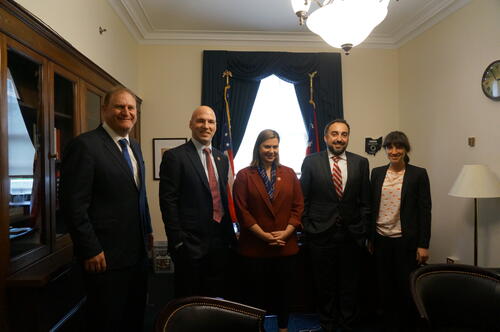Talking Election Security in the Nation’s Capital

Is the 2020 presidential election vulnerable to the same kind of foreign interference that took place in 2016? For a group of scholars at the new Stanford Cyber Policy Center at the Freeman Spogli Institute for International Studies (FSI), the answer is undoubtedly “yes.”
On the heels of their 108-page report recommending ways to prevent meddling in the 2020 U.S. presidential election, two of the 14 co-authors, Alex Stamos and Nathaniel Persily, landed in Washington, D.C. to share their findings with policymakers.
In Securing American Elections: Prescriptions for Enhancing the Integrity and Independence of the 2020 U.S. Presidential Election and Beyond, FSI experts present more than 45 policy recommendations to enable U.S. lawmakers and technology-sector leaders to confront potential threats to the American electoral process.
Sign up for the FSI Newsletter to get stories like this delivered straight to your inbox.
On a sunny day in our nation’s capital, Persily, co-director of the Cyber Policy Center and senior fellow at FSI, and Stamos, who is the director of the center’s Internet Observatory and former Chief Security Officer of Facebook, had a packed day ahead of them.
At the Mic with “Lawfare”
The first stop was an appearance on the national security-focused podcast “Lawfare” hosted by Susan Hennessy in cooperation with the Brookings Institute. During the 45-minute episode Stamos and Persily discussed the complex landscape of defending not just election infrastructure but also preserving the integrity of the information ecosystems in which Americans make their decisions about how to vote, including the possible consequences of regulating foreign media.
Listen to the complete episode here:
A Bipartisan Approach
Next on the agenda was a panel discussion at the Bipartisan Policy Center hosted by John Fortier, the organization’s Director of Governmental Studies. Persily and Stamos spoke about the safeguards needed to protect against foreign influence, and the policies internet platforms should adopt for political campaign advertising. They then took questions from the standing-room-only crowd, which included members from the American Bar Association, Brennan Center for Justice, Congressional Research Service and others interested in ensuring the integrity of our country’s democratic processes.
Headed Up the Hill
The Stanford delegation then headed to Capitol Hill, where they met with Rep. Anthony Gonzalez (R-OH), a freshman lawmaker, Stanford alum and former professional football player. Together with Elissa Slotkin (D-MI), a fellow freshman in Congress, former CIA analyst and Department of Defense official, the two lead a bipartisan working group on election security. Joined by Renée DiResta, a disinformation expert and the Internet Observatory’s research manager, Persily and Stamos spoke to Gonzalez, Slotkin and four other representatives about their recommendations for election security reform.

After leaving Capitol Hill, the Stanford group talked with a cybersecurity team from the Department of Homeland Security (DHS). Because election infrastructure — including voter registration databases, voting machines, technology systems used to manage elections, and storage facilities — is designated as critical infrastructure, DHS helps to support state and local election officials to reduce cyber risks to their election systems.
Growing the Network
The final stop of the day was at Stanford in Washington, where the team talked election security over dinner with a large group of Stanford alumni and guests, including representatives from Congress, social media and cybersecurity companies, advocacy groups and think tanks.

“Our goal today was to engage directly with the people in a position to make the policy changes required to better protect our elections,” said Persily. “I hope the Stanford team and I were able to play a small role in delivering better policy outcomes for the nation by the time the 2020 election is here.”
